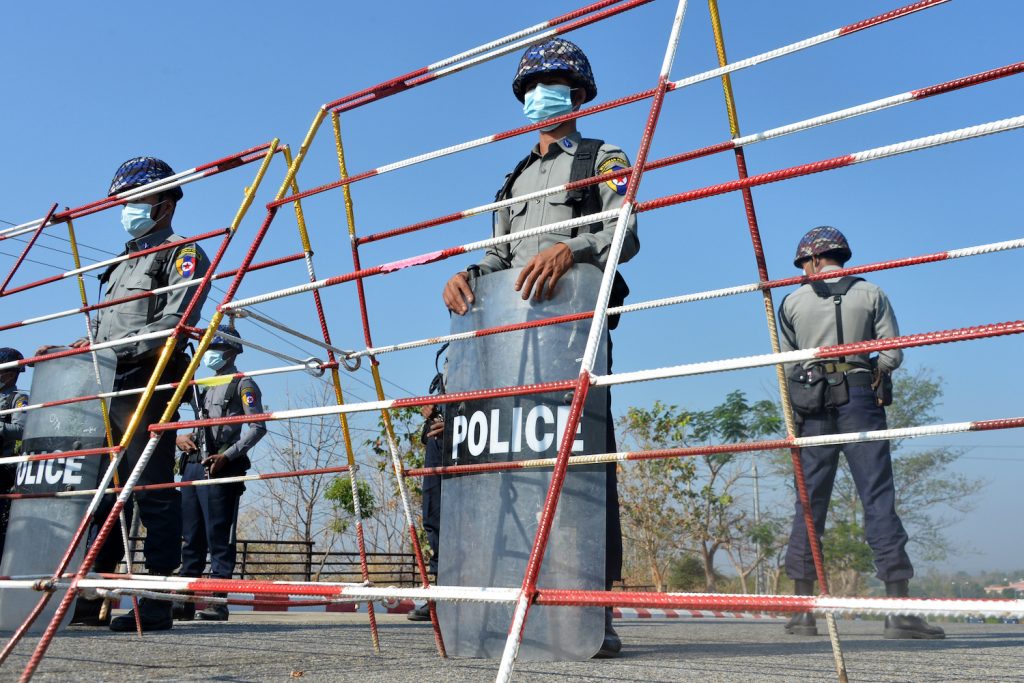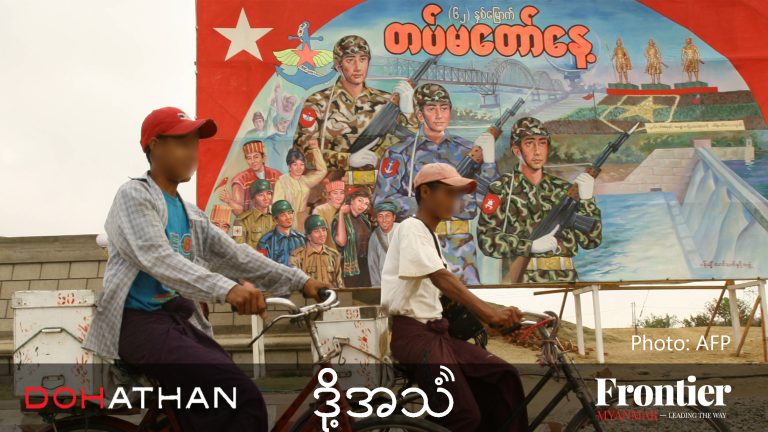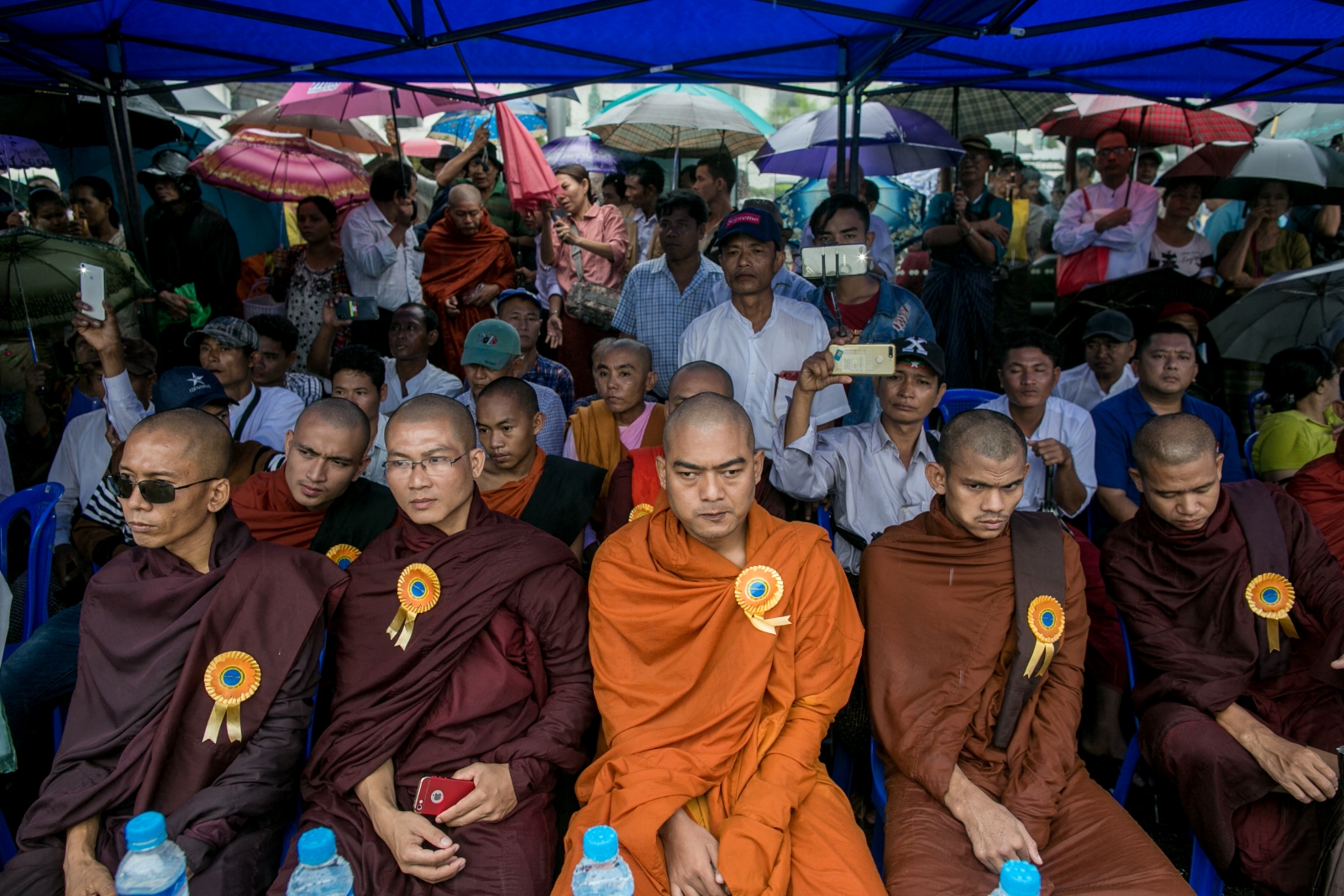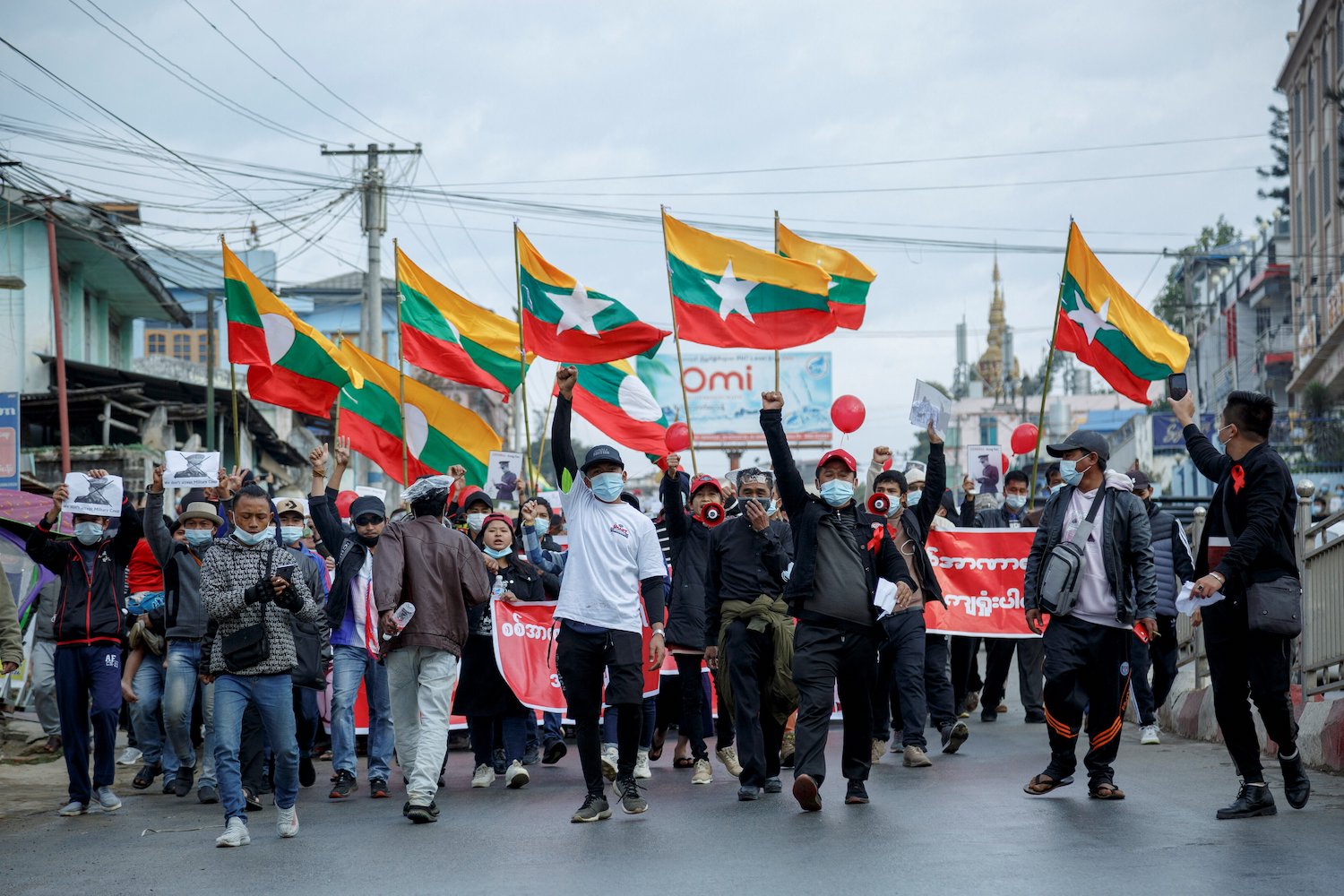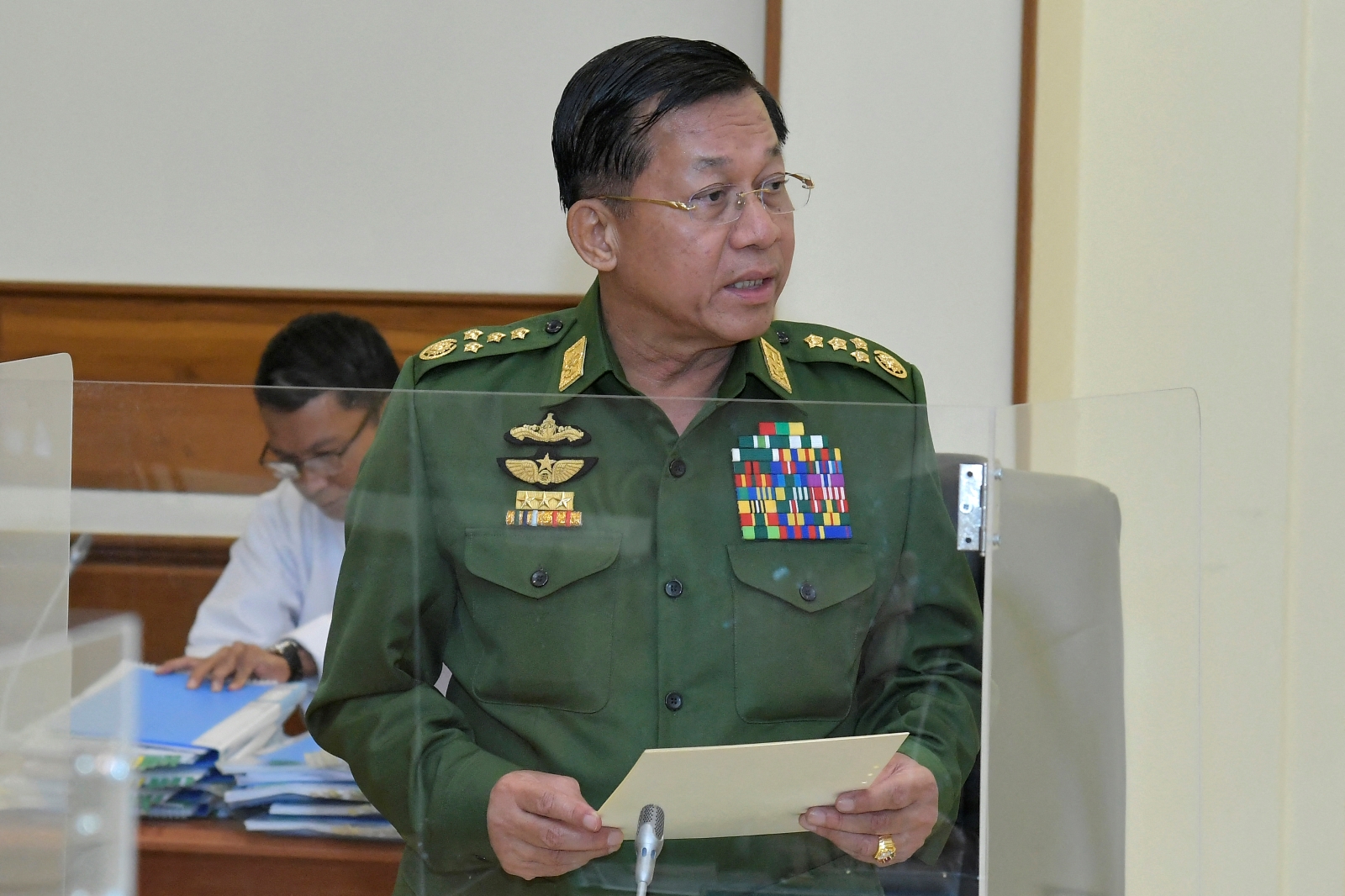The military has seemingly backed away from threats to abolish the constitution but does not appear to have reached a deal with the National League for Democracy ahead of the opening of parliament on Monday.
By EI EI TOE LWIN | FRONTIER
A Tatmadaw statement pledging to work in accordance with the constitution has eased fears of an imminent coup but not completely dispelled concerns that the military may be seeking to take power.
Talks are said to be continuing between the two sides, with the military pushing the government to address its allegations of electoral fraud in the November election – claims it has so far failed to substantiate.
The future of Senior General Min Aung Hlaing, whose term as commander-in-chief is due to expire in the middle of the year, is also thought to be part of the discussions.
His comments on Wednesday that the constitution could be abolished if it was not followed caused widespread alarm, with Western embassies and the United Nations issuing statements urging the military to respect the results of the election.
“We have to follow the constitution. If the law is not respected or followed, we must abolish it. Even if it is the constitution, we must abolish it,” he said, in remarks that were republished in military-run media.
Speculation began to grow that the military was planning to seize power ahead of the opening of the national parliament on Monday, prompting the Karen National Union and the country’s highest Buddhist authority, the State Sangha Maha Nayaka Committee, to also weigh in urging both sides to find a solution.
But this afternoon the Tatmadaw’s True News Information Team released a statement claiming the senior general’s words had been taken out of context or misquoted.
The statement affirmed that the Tatmadaw would act “within the legal framework … while safeguarding the existing constitution”.
“Some organisations and media defined the speech of the commander-in-chief of Defence Services as they liked and issued the statements and news analyses without respecting the full text of the speech,” the statement said.
No guarantees
Although the statement seemed intended to ease the country’s political crisis, it offered no guarantee that the Tatmadaw would honour the results of the election or allow the NLD to form the next government.
The Tatmadaw has says its investigation found more than 10 million suspect votes – a claim seemingly intended to cast doubt on the integrity of an election in which the NLD won 396 seats in the national parliament and the military-aligned Union Solidarity and Development Party just 33. The military has demanded the Union Election Commission release the full electoral roll for further scrutiny.
State Counsellor Daw Aung San Suu Kyi has not yet spoken publicly about the situation.
Asked for comment, NLD spokesperson Dr Myo Nyunt referred to Min Aung Hlaing’s remarks before the election, when he said that he would not stage a coup if it would hurt the country and damage the image of the military.
“I would like them [military] to consider whether the voter list errors are really serious enough to cause such damage,” Myo Nyunt said.
He suggested the NLD might be open to compromise, despite its firm belief that the election was free and fair. “We will deal with the situation in a stable way. To prevent violence, we are going to address all issues through our policy of national reconciliation,” he said.
Asked whether today’s Tatmadaw statement was the result of a deal between the Tatmadaw and NLD, Myo Nyunt said there had been no meetings between the sides since Thursday, when two government officials held talks with the military.
“I don’t know the reason behind the Tatmadaw statement,” he said, declining to reveal what the two sides had discussed on Thursday.
Frontier understands that no deal was reached at the meeting, with the Tatmadaw representatives demanding a recount of the election results and the postponement of the Pyithu Hluttaw session scheduled for Monday.
On Friday, the Supreme Court also began hearing an application of writs from the USDP and another military-linked party against the head of the UEC and President U Win Myint. The Supreme Court is expected to make a decision within 14 days.
As the hearing got underway by videoconference, dozens of trucks carrying USDP supporters made their way around the capital, bearing banners condemning the government and the election commission. In Yangon, a pro-military protest near Shwedagon Pagoda drew hundreds of demonstrators.
‘Everything is calm’
All eyes are now on whether the opening session of the Pyithu Hluttaw gets underway on Monday, and the Amyotha Hluttaw on Tuesday.
Elected lawmakers are quarantining at the municipal guesthouse in Nay Pyi Taw but went to parliament on Friday to receive COVID-19 vaccinations. Unelected military lawmakers were vaccinated this morning.
As tensions ratcheted up on Thursday, a large police contingent surrounded the guesthouse, leaving some lawmakers wondering whether they were about to be arrested.
MPs told Frontier they had received no special instructions from the party other than attend the sessions on Monday and Tuesday.
“It’s not clear whether a coup will take place. We aren’t too worried, but we’re all aware of the situation,” senior NLD lawmaker Daw Khin San Hlaing (Pyithu Hluttaw, Pale) told Frontier on Saturday. “I’m expecting the best but also preparing for the worst.”
She said she trusted Aung San Suu Kyi to be able to overcome the current crisis so that the first session of the Pyithu Hluttw could be convened successfully. “I’ve heard there are discussions between leaders. We believe they can do their best.”
A four-time election winner, Khin San Hlaing stayed loyal to the NLD through its darkest days under military rule. Nevertheless, she admitted to feeling “nervous” when a heavily armed police battalion arrived at the guesthouse on Thursday. The guesthouse normally has a relatively small number of unarmed police ensuring security, she said.
“I’ve never seen so much security in all the time I’ve been staying at the guesthouse. There were concerns … because the police are under the command of the military. However, we are looking at it like this: they have come here to provide security for us.”
Lower house whip U Maung Maung Oo (NLD, Insein) said the situation may be alarming for newer lawmakers, particularly those preparing to enter parliament for the first time, but most MPs were relaxed. This was because they were confident the military would not stop parliament from convening.
“Some are playing chinlon (cane ball) and some are cooking meals. Everything is normal,” Maung Maung Oo said.
“The situation is different from 1962 and 1988, when there were military coups. We already have a democratically elected government and also elected MPs. We are working according to the law. Specifically, we are following the constitution drafted by the military itself. I’m not worried about anything because we are not breaking the law.”
Incoming Pyithu Hluttaw lawmaker Ko Sithu Maung (NLD, Pabedan) said he was initially worried when security forces arrived. “Later we learned that security is being provided to lawmakers to ensure their safety,” he said.
Senior MPs from each state and region are in constant contact with the party headquarters and are sharing information with all lawmakers, Ko Sithu Maung added.
“We are also constantly reading the news,” he said. “As a new member of parliament I am just learning from my seniors. Everything is calm.”


